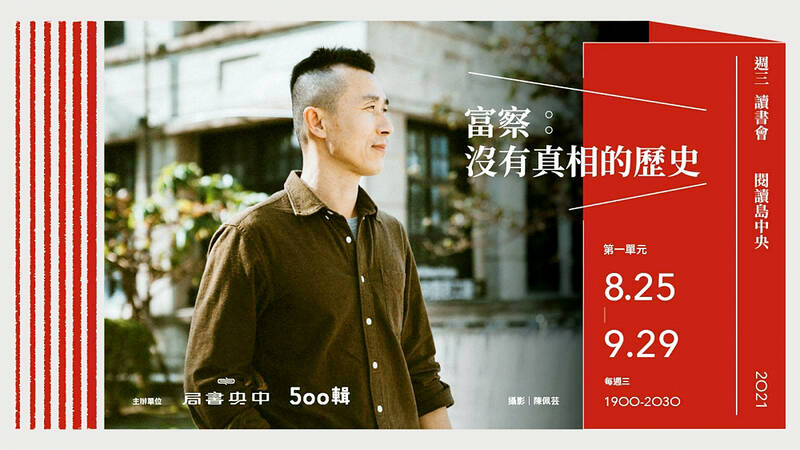Members of the Taiwan Association for Human Rights and other human rights groups yesterday called on Beijing to allow detained publisher Li Yanhe’s (李延賀) family to have access to him.
Li, who is the editor-in-chief of Gusa Press (八旗文化), was detained while visiting relatives in China in March.
China’s Taiwan Affairs Office spokeswoman Zhu Fenglian (朱鳳蓮) confirmed at a news conference on April 26 that Li was “under investigation by national security organs on suspicion of engaging in activities endangering national security.”

Photo: Screen grab from Facebook
Rights groups yesterday said that Li is being held by Chinese authorities at an undisclosed location as he awaits trial, and that his family has been unable to contact him.
Beijing is violating universal human rights through its institutionalized and systematic arrests of Taiwanese in China, the groups said in a statement.
Chinese authorities arrested democracy advocates Lee Ming-che (李明哲) in 2017, Lee Meng-chu (李孟居) in 2019 and Yang Chih-yuan (楊智淵) last year, all of whom had been denied contact with their families in violation of their rights, the statement said.
According to joint investigations by Spain-based Safeguard Defenders, the Network of Chinese Human Rights Defenders, the International Service for Human Rights and the Rights Practice, China maintains a network of secret jails for pre-trial detention under what it calls Residential Surveillance at a Designated Location (RSDL).
A 2021 report by the Safeguard Defenders said use of RSDL was “tantamount to an enforced or involuntary disappearance, and that torture and maltreatment were common in the system.”
It also cited an increased use of RSDL against human rights advocates, and said that the lack of judicial oversight and prolonged detention without charges constitutes arbitrary detention.
“Detainees are often arbitrarily detained for six months or more, and sometimes as long as four years. They are also often coerced into signing a document waiving their right to a lawyer,” the association said.
While in detention, Li would likely be monitored by at least two guards, 24 hours a day, and would even be watched when using the toilet, it said, adding that he would also be completely isolated from the outside world.
Describing torture methods that Chinese authorities use, the association said that lights in detention cells are kept turned on 24 hours a day, detainees are deprived of sleep and prohibited from reading.
“Detainees are also given unknown drugs, are prohibited from seeking medical treatment, are often not allowed to take a bath and are not given an hour of outdoor activities, which required by law,” it said.
The groups urged Beijing to adhere to international human rights laws on the treatment of detainees, which stipulate that torture and inhumane treatment cannot be used.
Detainees should be given access to lawyers in accordance with articles 34 and 39 of the Criminal Procedure Law of the People’s Republic of China, and should be allowed visits by family members, they said.

DEFENSE: The National Security Bureau promised to expand communication and intelligence cooperation with global partners and enhance its strategic analytical skills China has not only increased military exercises and “gray zone” tactics against Taiwan this year, but also continues to recruit military personnel for espionage, the National Security Bureau (NSB) said yesterday in a report to the Legislative Yuan. The bureau submitted the report ahead of NSB Director-General Tsai Ming-yen’s (蔡明彥) appearance before the Foreign and National Defense Committee today. Last year, the Chinese People’s Liberation Army (PLA) conducted “Joint Sword-2024A and B” military exercises targeting Taiwan and carried out 40 combat readiness patrols, the bureau said. In addition, Chinese military aircraft entered Taiwan’s airspace 3,070 times last year, up about

Taiwan is stepping up plans to create self-sufficient supply chains for combat drones and increase foreign orders from the US to counter China’s numerical superiority, a defense official said on Saturday. Commenting on condition of anonymity, the official said the nation’s armed forces are in agreement with US Admiral Samuel Paparo’s assessment that Taiwan’s military must be prepared to turn the nation’s waters into a “hellscape” for the Chinese People’s Liberation Army (PLA). Paparo, the commander of the US Indo-Pacific Command, reiterated the concept during a Congressional hearing in Washington on Wednesday. He first coined the term in a security conference last

A magnitude 4.3 earthquake struck eastern Taiwan's Hualien County at 8:31am today, according to the Central Weather Administration (CWA). The epicenter of the temblor was located in Hualien County, about 70.3 kilometers south southwest of Hualien County Hall, at a depth of 23.2km, according to the administration. There were no immediate reports of damage resulting from the quake. The earthquake's intensity, which gauges the actual effect of a temblor, was highest in Taitung County, where it measured 3 on Taiwan's 7-tier intensity scale. The quake also measured an intensity of 2 in Hualien and Nantou counties, the CWA said.

The Overseas Community Affairs Council (OCAC) yesterday announced a fundraising campaign to support survivors of the magnitude 7.7 earthquake that struck Myanmar on March 28, with two prayer events scheduled in Taipei and Taichung later this week. “While initial rescue operations have concluded [in Myanmar], many survivors are now facing increasingly difficult living conditions,” OCAC Minister Hsu Chia-ching (徐佳青) told a news conference in Taipei. The fundraising campaign, which runs through May 31, is focused on supporting the reconstruction of damaged overseas compatriot schools, assisting students from Myanmar in Taiwan, and providing essential items, such as drinking water, food and medical supplies,